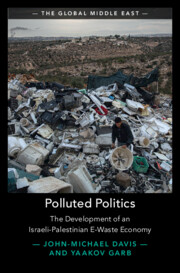Book contents
- Polluted Politics
- The Global Middle East
- Polluted Politics
- Copyright page
- Contents
- Figures
- Preface:
- Acknowledgments
- Part I Positioning E-Waste Hubs
- 1 The Emergence of E-Waste Hubs
- 2 The West Line E-Waste Economy
- 3 Crude Portrayals, Crude Proposals
- 4 Co-creating E-Waste Hub Futures
- 5 Can Tails Wag the Dog?
- Part II Pathways and Predicaments
- References
- Index
5 - Can Tails Wag the Dog?
A Hub-Driven Approach to E-Waste Reform
from Part I - Positioning E-Waste Hubs
Published online by Cambridge University Press: 18 December 2024
- Polluted Politics
- The Global Middle East
- Polluted Politics
- Copyright page
- Contents
- Figures
- Preface:
- Acknowledgments
- Part I Positioning E-Waste Hubs
- 1 The Emergence of E-Waste Hubs
- 2 The West Line E-Waste Economy
- 3 Crude Portrayals, Crude Proposals
- 4 Co-creating E-Waste Hub Futures
- 5 Can Tails Wag the Dog?
- Part II Pathways and Predicaments
- References
- Index
Summary
We build on Chapter three’s description of e-waste hubs as vital economic actors, rather than simply dumping sites, and Chapter four’s account of a consensual development vision for the West Line hub, to argue for the pragmatic and ethical necessity and advantages of centering e-waste hubs in e-waste policies. Existing EPR e-waste policies, generated in the Global North and adopted globally, usually ignore informal actors and dynamics, or propose formalizing them in a way that redirects attention and resources away from the value chains and sites that have historically collected and recycled most of the world’s e-waste. A hub-centered policy would boost the effectiveness and coherence of e-waste policies by accounting for and building on their entrepreneurial agility and expertise, decentralising decisions and interventions to actors with nuanced local knowledge, greater accountability, and long-term stakes in policies that not only propose solutions in the center but grapple with existing capacities and toxic legacies in the periphery. We briefly describe the interlocked arms of the West Line model for such restructuring elaborated in the following three chapters: curbing destructive practices through local enforcement; remediating past damage; and preserving livelihoods though environmental upgrading of the recycling processes.
Keywords
- Type
- Chapter
- Information
- Polluted PoliticsThe Development of an Israeli-Palestinian E-Waste Economy, pp. 105 - 132Publisher: Cambridge University PressPrint publication year: 2024

